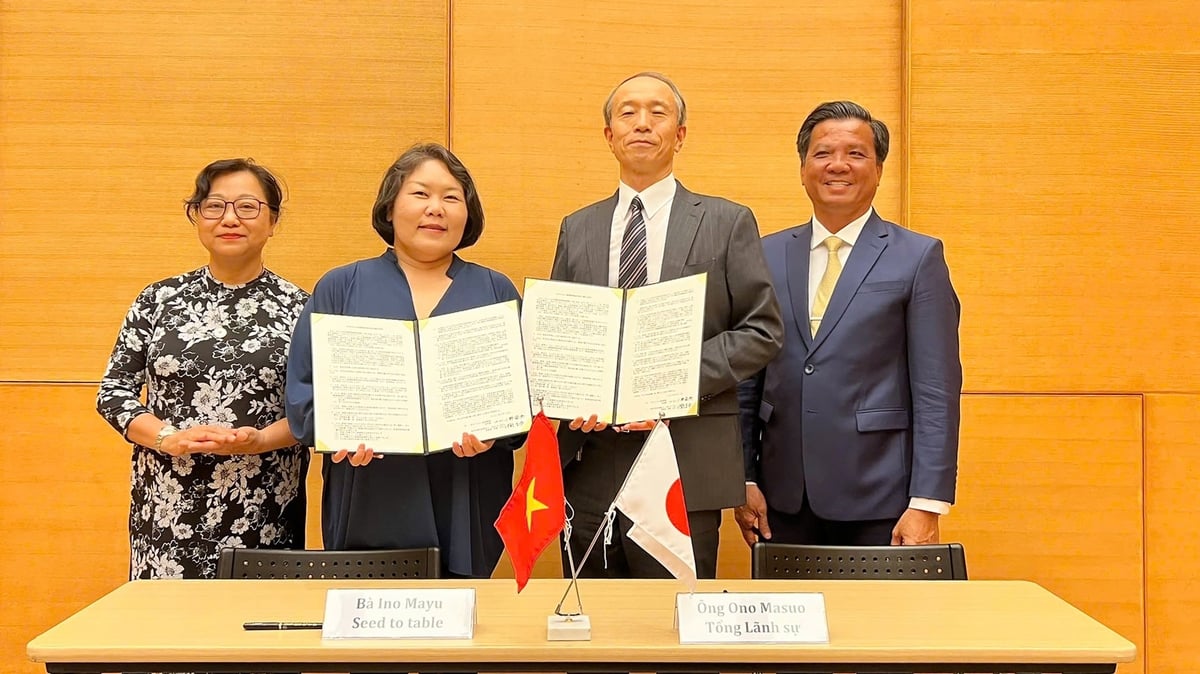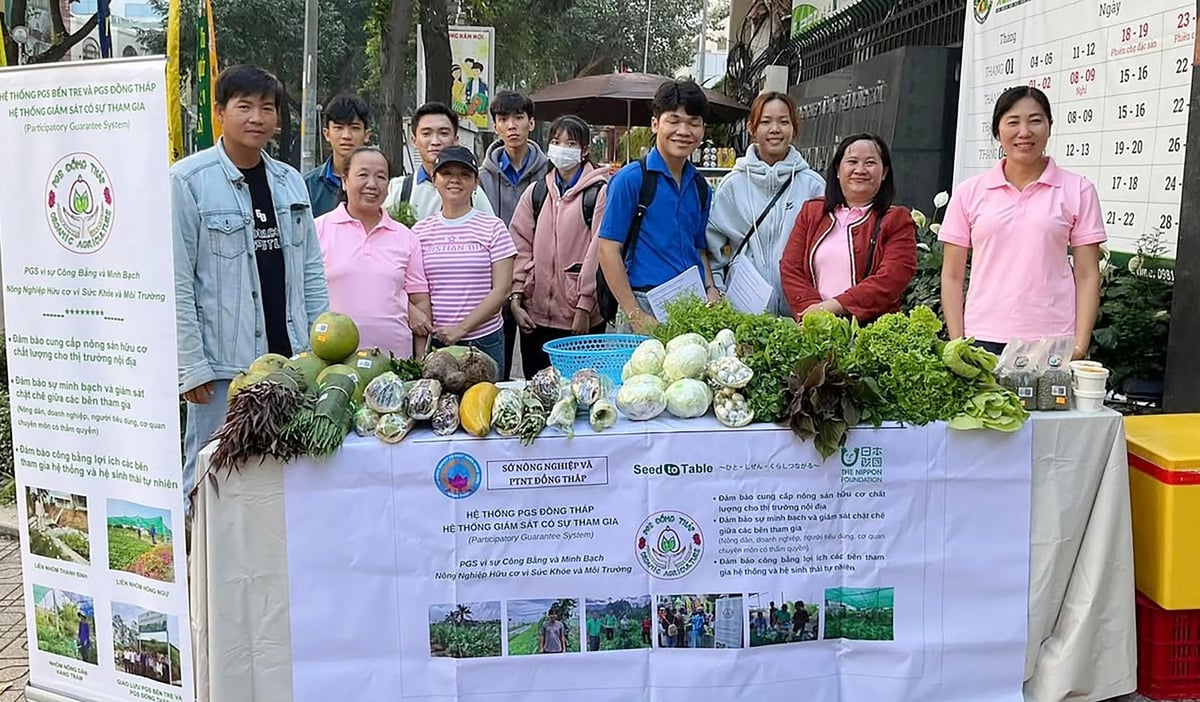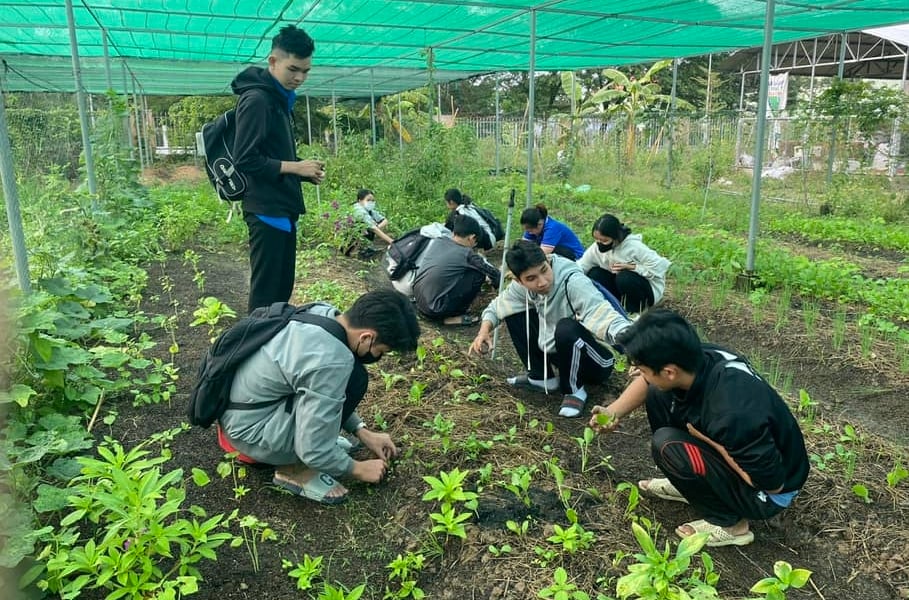May 20, 2025 | 14:23 GMT +7
May 20, 2025 | 14:23 GMT +7
Hotline: 0913.378.918
May 20, 2025 | 14:23 GMT +7
Hotline: 0913.378.918

Japan provides nearly 160.000 USD in grant aid to develop an organic agriculture project in Dong Thap. Photo: Nguyen Thuy.
On May 19, the Consulate General of Japan in Ho Chi Minh City signed a grant agreement with the organization Seed to Table to implement the project titled “Sustainable community development through human resource training in organic agriculture, food processing, and business management" (referred to as the Project). This marks the third and final year of the grant support for the Project.
The project, implemented by the Japanese non-governmental organization Seed to Table in Dong Thap province since 2019, has been financially supported by the Japanese government. Since its inception, the project has continuously expanded both in scale and content, with the aim of fostering sustainable development in rural communities through organic agriculture.
According to Mr. Le Chi Thien, Director of the Department of Agriculture and Environment of Dong Thap province, the project has significantly contributed to transforming the local approach to agricultural production. Over 200 officials from various sectors, including agriculture, education, women's associations, and local governments, have received comprehensive training through the project. In addition, hundreds of farmers and students have received training on organic farming techniques, agricultural product processing, and business management, with direct guidance from Japanese experts.
"The province has successfully established 9 organic farming groups, covering a total area of 5.6 hectares. Out of these, 8 groups have achieved the PGS Vietnam certification, which is a national standard for small-scale organic agricultural products," said Mr. Le Chi Thien.

PGS-certified organic vegetables from Dong Thap are sold at the Kind Green Market (135A Pasteur Street, Vo Thi Sau Ward, District 1, Ho Chi Minh City). Photo: Seed to Table.
The project not only focuses on production but also accompanies the local community throughout the value chain. This includes building vegetable growing houses at schools, providing storage and processing equipment for Dong Thap Community College, developing organic agriculture curricula, establishing a local PGS system, and creating product traceability labels. At the same time, the project connects agricultural products to the market in Ho Chi Minh City and organizes study trips to Japan, helping people improve their practical skills and management capabilities.
Mr. Ono Masuo, the Consul General of Japan in Ho Chi Minh City, stated that Japan highly appreciates the efforts and close cooperation from Dong Thap province. The project has not only contributed to improving farmers' livelihoods but also raised environmental awareness within the community. The total aid for the third year of the project is nearly 160.000 USD.
The Consul General of Japan in Ho Chi Minh City also reaffirmed Japan’s strong commitment to accompanying and providing maximum support for the project's implementation. He expressed hope that the organic agriculture model would be further expanded across Vietnam, through the positive influence of localities like Dong Thap.
Ms. Nguyen Thi Thuy Ha, Director of the Department of Education and Training of Dong Thap province, stated that thanks to the effective collaboration between the education sector and the Seed to Table organization, 21 secondary and high schools in the province have established organic vegetable gardens.
"This is the result of students not only learning theory but also directly experiencing vegetable cultivation, food processing, understanding clean production processes, and learning how to protect the environment through real-life activities," said Ms. Nguyen Thi Thuy Ha. She further noted that, although the model has initially delivered positive results, there remain several challenges. These include difficulties in sustaining the activities at some schools due to constraints in funding, limited land availability, and a shortage of human resources.

Students in Dong Thap province have the opportunity to participate in, learn about, and experience organic vegetable farming. Photo: Seed to Table.
In the coming period, the education sector of Dong Thap province will continue its collaboration with the organization Seed to Table to promote awareness, provide training, and expand the organic agriculture model. The goal is to gradually incorporate organic products into school meal programs and integrate the "organic vegetable garden" criterion into the standards for green, clean, and beautiful schools.
Ms. Ino Mayu, Chief Representative of the Seed to Table organization, stated that, following the completion of necessary administrative procedures, the project is expected to officially launch in June in Dong Thap province.
"Once the project concludes, we intend to hand it over to the authorities of Dong Thap. Our hope is that, five to ten years from now, the project will continue to grow and evolve into an official initiative of Dong Thap Province, rather than remaining solely a program of Seed to Table," said Ms. Ino Mayu.
Translated by Phuong Linh

(VAN) For years, the CRISPR-Cas9 genome technology has been reshaping genetic engineering, a precision tool to transform everything from agriculture to medicine.

(VAN) Vietnam aims to become a 'leader' in the region in the capacity and managing effectively soil health and crop nutrition.
![Reducing emissions from rice fields: [Part 1] Farming clean rice together](https://t.ex-cdn.com/nongnghiepmoitruong.vn/608w/files/news/2025/05/05/z6509661417740_a647202949c539012a959e841c03e1d3-nongnghiep-143611.jpg)
(VAN) Growing clean rice helps reduce environmental pollution while increasing income, allowing farmers to feel secure in production and remain committed to their fields for the long term.
/2025/05/19/5136-1-144800_230.jpg)
(VAN) The Nghe An Provincial People's Committee has just approved the list of beneficiaries eligible for revenue from the Emission Reductions Payment Agreement (ERPA) in the North Central region for the year 2025.

(VAN) 14 out of 35 domesticated elephants in Dak Lak province have had their living conditions improved, with 11 of them currently participating in the non-riding elephant tourism model.

(VAN) Muong Nhe Nature Reserve hopes that being upgraded to a national park will lay the foundation for forest protection efforts to be carried out in a systematic, modern, and sustainable manner.